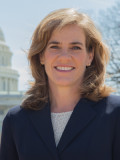
 By BJC General Counsel Holly Hollman
By BJC General Counsel Holly Hollman
Protecting religious liberty often involves treating religion in special ways. In addition to protecting against government-sponsored religion, the BJC is known for supporting laws that accommodate religion, some of which provide exemptions from otherwise applicable laws. Respect for religious liberty should demand such accommodations where they do not threaten the rights of others or undermine compelling governmental interests.
It is difficult, however, to justify accommodations for the exercise of a religious belief that would negatively impact someone else. Claims for exemptions from nondiscrimination laws — laws specifically crafted to protect individual rights — present a particular challenge for religious liberty conscience claims. The BJC’s latest Supreme Court brief explores this. Our friend-of-the-court brief in Masterpiece Cakeshop v. Colorado reviews how nondiscrimination laws — like Colorado’s public accommodation law — are good for religious liberty. Those laws protect customers from being denied goods and services based on their religious identity (in addition to other characteristics) and typically exempt houses of worship. The Constitution does not require an exemption from such laws designed to prevent discrimination in the commercial marketplace for a baker who sells wedding cakes to the public but opposes same-sex marriage.
In this case, the commercial baker is claiming a right under the Free Speech and Free Exercise Clauses to an exemption from a state public accommodation law. Under that law, any commercial bakery that sells custom wedding cakes to opposite-sex couples must also sell them on the same basis to same-sex couples. The baker argues that the state cannot apply the anti-discrimination law to the sale of his custom wedding cakes because preparing a wedding cake is artistic expression that celebrates marriage, and the state cannot make him celebrate same-sex marriages. The baker also considers his work to be active participation in marriage since he believes the wedding cake is a centerpiece of wedding festivities.
On the other side, Colorado and the couple who was denied services want enforcement of that state law that provides equal access to the commercial marketplace. Colorado’s Anti-Discrimination Act applies to businesses that are open to the public and prohibits them from refusing to serve a customer based on certain personal characteristics: disability, race, creed (religion), color, sex, sexual orientation, marital status, national origin or ancestry.
The baker claims that he is being forced to participate in something he views as religious, but the claim is not limited in any meaningful way. The couple asked for a cake for a reception that was held in a different venue, on a different date and in a different state from the wedding ceremony. If an exemption is granted in this case, the brief argues “[r]eligious liberty itself would suffer, as religious individuals would be subject to being denied service because the commercial proprietor’s religious views differed from theirs.” This could include an interracial or interfaith couple’s wedding, a bar mitzvah, or even a birthday or graduation party. While the bakery owner’s religious objections are sincere, they do not warrant granting such a broad religious-based exemption, which would allow every business owner to defeat the purpose of the nondiscrimination law by simply asserting a religious justification.
The brief filed by the BJC, along with the General Synod of the United Church of Christ, the Episcopal Church, the Evangelical Lutheran Church in America and the Chicago Theological Seminary, emphasizes the importance of context in weighing the religious liberty arguments in this case. It says that the Colorado statute strikes an appropriate balance respecting religious liberty and ensuring access without unlawful discrimination in the commercial marketplace. Houses of worship and other institutions principally used for religious purposes are not affected. Whether this baker wins or loses does not determine other religious rights with regard to beliefs about marriage or other religious matters outside this context.
Free exercise claims should be treated respectfully and seriously. The Constitution and other laws protect religious liberty in different ways in different contexts. Free exercise law provides many protections for the religious beliefs and actions of individuals and institutions that oppose same-sex marriage for religious reasons. Legislative compromises that account for the interests of all sides may be possible through carefully negotiated exemptions. The Constitution, however, does not provide a right for commercial vendors to refuse to sell goods and services to certain people in violation of a nondiscrimination law by simply asserting a faith-based reason. We must protect all of our churches and religious beliefs about marriage and — at the same time — recognize as citizens and Christians that we should treat all equally and without regard to religious differences in the commercial marketplace.
For more on this case — including a podcast with Hollman — visit BJConline.org/Masterpiece.
This article appeared in the November/December 2017 edition of Report from the Capital. You can also read the digital version of the magazine or view it as a PDF.




